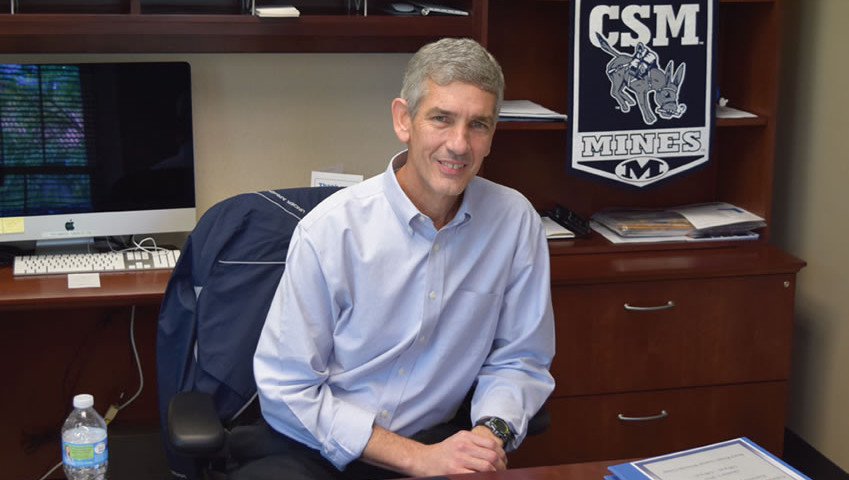While Mines President Paul Johnson knows exactly where his M-Climb rock lies on Mt. Zion, it is unlikely that he will need to retrieve it anytime soon. “The M-Climb was a blast,” said President Johnson. “By the time you get all the way to the M and look down on campus, it is just so beautiful and you feel really proud to be a part of it.”
Dr. Paul Johnson was appointed Mines’ 17th President on July 1st, and has spent his first few months as President learning about Mines’ traditions, connecting with students and faculty, and outlining educational goals for the institution.
“Every institution has to evolve with time,” he suggests. “The students change, the needs of society change, and the institution needs to somehow continue to attract the type of students who are going to go off and do wonderful things.”
Some of President Johnson’s top priorities will be sharing the Mines story with community members and establishing Colorado School of Mines as a leader in STEM Education and a forum for the technical side of important political and societal issues.
“It would also be great to be more innovative in how we deliver our education,” asserts President Johnson. “We have a lot of faculty who are really interested in that but aren’t really sure they have the support to do it.” President Johnson hopes to continue working with the Center for Innovative Teaching and Learning to reach this goal and promote experiential learning on campus.
Previous Programs at ASU, Research Shape Future Campus Changes
“A lot of learning doesn’t take place in a classroom anymore,” explains President Johnson.
As such, some of his learning goals include involving students more directly in the engineering process from the very beginning of their time here at Mines.
The former Executive Dean of Arizona State University’s Ira A. Fulton Schools of Engineering, President Johnson received several degrees in Chemical Engineering but decided to focus his early career in groundwater research and other environmental topics.
“Don’t be too worried that the choices that you make now with the major that you choose or the classes that you take will constrain your life or employment,” President Johnson advises students.
Even though he had no formal coursework in groundwater research, he was inspired by the interdisciplinary nature of the work and decided to take the opportunity.
“I’ve always been fascinated with environmental research because there is a societal component to the work,” President Johnson explains. “We all value groundwater and like to live in a clean environment, so you feel good about what you are doing.”
President Johnson also explains that speaking with the field’s technically skilled scientists and engineers, regulators, and the public all at once illustrated the importance of communication within engineering disciplines.
From teaching a CSM101 class, to participating in campus events like the Oredigger Challenge, President Johnson also hopes to connect with students and encourage them to get involved and speak up.
“Talking with a faculty member doesn’t have to be in the context of a class,” President Johnson explains. “We are all part of the community, we are all very interested in the success of the students and the institution.”
Overall, President Johnson explains that he is excited to be part of the Mines community because it is in a beautiful location and has a reputation for producing fantastic students.
As President Johnson is proud to point out, “The Mines name on your degree says a lot about you, and that in itself will provide opportunities for you outside of what you might expect.”


'President Johnson Hopes to Connect with Students, Community' has no comments
Be the first to comment this post!